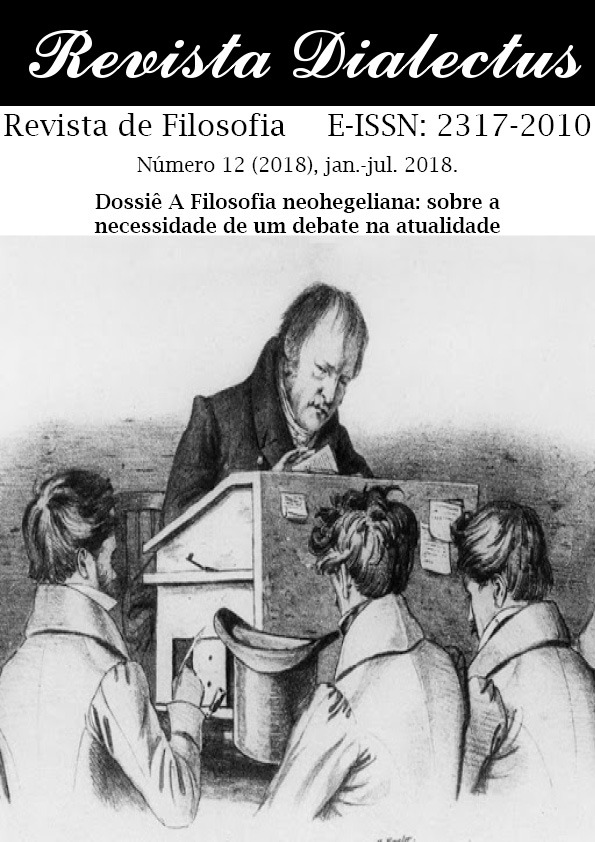O EMPIRISMO CONJECTURAL DE KANT
DOI:
https://doi.org/10.30611/2018n12id33216Keywords:
Empirismo. Conjectural. Kant.Abstract
O presente artigo pretende apresentar a tese epistemológica de Kant na Crítica da Razão Pura como um empirismo conjectural. A parte da obra que foi enfocada nesse projeto é a Analítica Transcendental, com especial olhar para o argumento da Dedução Transcendental. Foi sugerido que a teoria dos princípios sintéticos – usados para identificar uma unidade objetiva nas representações – aponta para uma epistemologia centrada em princípios heurísticos, (embora essa conexão só fique clara quando Kant discute o uso regulativo das ideias, na Doutrina do Método). Esse apontamento será explorado através da sugestão de que a combinação de teses racionalistas e empiristas na Crítica da Razão Pura é melhor compreendida como um empirismo conjectural. Pretendemos apresentar a noção de conjectura como uma chave de leitura para entender a singularidade do complexo doutrinal de Kant na sua primeira obra do período Crítico, especialmente para explicar sua posição intermediária (entre diversas teses, como o realismo e o idealismo, o empirismo e o racionalismo, etc) e o modo como ele paga o preço para propor um realismo sem metafísica.References
ABELA, P. Kant’s empirical realism. Clarendon Press, 2006.
ALLISON, H. Kant’s transcendental idealism. Yale University Press, 2004.
AMERIKS, K. Kant’s elliptical path. Oxford University Press, 2012.
BENNET, J. Kant’s dialectic. Cambridge University Pres, 1974
BENNETT, J. Strawson on Kant. Philosophical Review, n. 77, p. 340 – 349, 1968.
BEISER, Frederick. German idealism: the struggle against subjectivism 1781-1801. Londres: Harvard University Press, 2002.
BIRD, G. The revolutionary Kant. Carus Publishing Company, 2006.
BONACCINI, J. Kant e o problema da coisa em si no idealismo alemão: sua atualidade e relevância para compreensão do problema da Filosofia. Rio de Janeiro: Relume Dumará, 2003.
CAYGILL, H. Dicionário Kant. Rio de Janeiro: Jorge Zahar, 2005.
GREEN, G. The aporia od inner sense: the self-knowledge of reason and the critique of metaphysics in Kant. Brill, 2010.
GUYER, P. Kant and the claims of knowledge. Cambridge University Press, 1987.
HANNA, R. Kant e os fundamentos da filosofia analítica. São Leopoldo: Editora Unisinos, 2004.
KANT, I. Crítica da Razão Pura. Lisboa: Fundação Calouste Gulbenkian, 2001.
KANT, I. Prolegômenos a toda futura metafísica que queira apresentar-se como ciência. Edições 70, 2008.
KITCHER, P. Kant’s transcendental psychology. Oxford: Oxford University Press, 1990.
LOUDEN, R. Kant’s human being: essays on his theory of human nature. New York: Oxford University Press, 2011.
LANGTON, R. Kant humility: our ignorance of things in themselves. Oxford University Press, 2008.
LONGUENESSE, B. Kant and the capacity to judge. Princeton University Press, 1998.
MAKKREEL, R.A. Kant on the scientific status of psychology, anthropology, and history. In: kant and the sciences, ed. Eric Watkins. New York: Oxford University Press, 2001. p. 185-201
MOSSER, K. Necessity and possibility: the logical strategy of Kant’s critique of pure reason. Washington: The Catholic University of America Press, 2008.
PIPPIN, R. B. Kant’s theory of form: an essay on the critique of pure reason. Yale University Press, 1982.
SCHRADER , George. The Review of Metaphysics, Vol. 4, No. 4 (Jun., 1951), pp. 507-536.
STRAWSON, P. The bounds of sense: an essay on Kant’s Critique of pure reason. London, Methuen & Co. Ltd.; New York, Barnes & Noble, Inc., 1966.
WAXMAN, W. Kant’s model of the mind: a new interpretation of transcendental idealism. Oxford University Press, 1991.
WOOD, A.; GUYER, P.; ALLISON, H. E. Debating allison on transcendental idealism. Kantian Review, v. 12, p. 1 – 39, Jul, 2007.
Downloads
Published
Issue
Section
License
Authors who publish in this journal agree to the following terms:
- Authors retain the copyright and grant the journal the right of first publication, with the work simultaneously licensed under the Attribution-NonCommercial-NoDerivatives 4.0 International (CC BY-NC-ND 4.0) License, which allows the non-commercial sharing of work, without modifications and with acknowledgment of authorship and initial publication in this journal.
- Authors are authorized to take additional contracts separately, for non-exclusive distribution of the version of the work published in this journal (eg publish in institutional repository or as a book chapter), with acknowledgment of authorship and initial publication in this journal.
- Authors are allowed and encouraged to publish and distribute their work online (eg in institutional repositories or on their personal page) at any point before or during the editorial process, as this can generate productive changes as well as increase the impact and citation of published work (See The Free Access Effect).



















